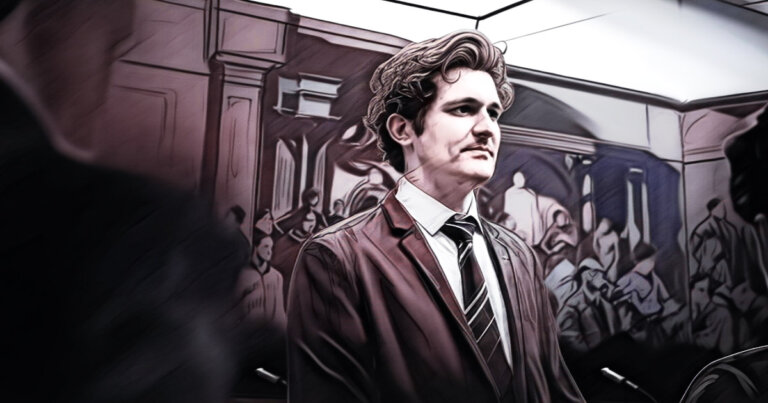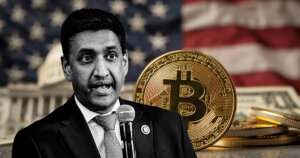 SBF Trial Day 15 – SBF pleads not guilty to all charges as defense rests its case
SBF Trial Day 15 – SBF pleads not guilty to all charges as defense rests its case SBF Trial Day 15 – SBF pleads not guilty to all charges as defense rests its case
The day's proceedings revolved around scrutinizing SBF's relationship with the Bahamian government, handling customer funds, and transparency issues.

Cover art/illustration via CryptoSlate. Image includes combined content which may include AI-generated content.
Day 15 of the Sam Bankman-Fried (SBF) trial began with the prosecution continuing its cross-examination of the defendant and concluded with the defense resting its case and preparing for closing arguments.
The day’s proceedings revolved around scrutinizing SBF’s relationship with the Bahamian government, handling customer funds, and transparency issues. The defense conducted a re-direct examination to clarify the former billionaire’s stance on some of the points raised by the prosecution.
The prosecution also said it no longer intends to bring rebuttal witnesses to the stand, which means the trial will likely conclude earlier than expected.
Cross-examination continues
The prosecution started the cross with questions about SBF’s relationship with the Bahamian government, specifically Prime Minister Philip Davis.
SBF acknowledged that he had cultivated relations with some members of the government. However, when asked about discussions related to paying off the Bahamian national debt, SBF claimed not to remember.
The prosecution continued by questioning SBF about his involvement in helping the PM’s son secure a job, to which SBF responded that he had talked with him but did not recall the details.
AUSA Sassoon then asked whether SBF had ever boasted that Ryan Salame was essentially a member of the Bahamian government. SBF again claimed he did not remember.
The prosecution introduced evidence in the form of an exhibit, referred to as “Project Chinchilla Chatter,” which included a message where SBF acknowledged Ryan Salame’s name. SBF admitted to writing the message.
AUSA Sassoon pressed further, asking whether SBF had given the Bahamas Prime Minister floor-side seats at the Miami Heat Arena. SBF stated that he did not recall such an event. However, the prosecution presented a message where SBF mentioned the PM being in FTX’s court-side seats with his wife.
The line of questioning then shifted to SBF’s interactions with prominent figures, including Bill Clinton and Tony Blair. SBF confirmed that he had invited them to an event, mentioning his introduction to Bill Clinton through Michael Kives.
The prosecution played a video featuring SBF alongside Bill Clinton, Tony Blair, Katy Perry, and Orlando Bloom to further cement its point.
Sassoon questioned whether SBF allowed the Bahamas Prime Minister to withdraw funds. SBF clarified that it was another member of the government who sought withdrawals.
The prosecution presented an email allegedly authorizing Bahamian customers to withdraw and be made whole, which SBF confirmed. However, SBF explained that this authorization was for a short period.
Regarding financial matters, Sassoon inquired whether banks were reluctant to transact with a crypto exchange. SBF expressed uncertainty about the meaning of “transact” in this context. The prosecution also questioned him about his actions after finding out about the $8 billion shortfall.
SBF said he had learned about the bug that caused the discrepancy but did not inquire about it.
The prosecution then focused on a financial matter related to North Dimension, asking if SBF was aware of deposits being directed there. SBF admitted to becoming aware of it at some point but noted that it did not mention Alameda Research.
The prosecution also asked SBF if he had disclosed that Alameda was spending out of customer deposits. The former billionaire claimed that he believed he had not revealed it and expressed regret at not doing so.
The questioning concluded with AUSA Sassoon asking about the individuals on both the trading and settlement teams. SBF said he did not recall specific details about particular employees’ roles.
Defense attempts to clarify SBF’s stance
Following the intense cross-examination, SBF’s defense team took the opportunity to question his client during the re-direct examination. It allowed SBF to provide context and nuance to his responses and reinforce certain aspects of his testimony.
The defense primarily addressed concerns regarding SBF’s involvement in the Robin Hood litigation. SBF explained that his attorney was assigned to handle the return of shares to bankruptcy, and his intention was not to assert control over these shares.
This clarification emphasized that he was following legal procedures regarding the Robin Hood shares.
The defense also delved into SBF’s familiarity with the AWS database. SBF explained that he had familiarized himself with the database, indicating a general understanding of its operations. This insight was likely provided to shed light on SBF’s level of involvement in the technical aspects of the FTX platform.
The re-direct examination allowed SBF to address the challenges associated with managing customer accounts and the complexity of the cryptocurrency exchange business. SBF likely aimed to convey that running such a platform involved intricate and multifaceted responsibilities.
Charge consideration
The prosecution and defense took a sidebar for charge consideration at the end of the proceedings. The sidebar revolved around debates about the language used in the indictment, with SBF’s lawyer objecting to charges that omitted the misappropriation theory.
The defense emphasized the need for specificity in the indictment. However, Judge Kaplan overruled this objection, highlighting the importance of clarity in the charges.
The prosecution raised concerns about language in the indictment related to campaign finance charges. The prosecution requested that the term “alleged” be stricken when referring to straw donations. The defense did not object to this adjustment.
The prosecution also sought to include a jury instruction on the concept of conscious avoidance, particularly in light of SBF’s claim that he overheard information about certain financial matters but did not take action. The defense opposed this instruction, but it was ultimately included in the charge.
One step closer to the verdict
With the cross-examination and re-direct examination complete, the trial of SBF moves closer to its conclusion. The next phase will involve closing arguments, during which both the prosecution and the defense will present their final arguments to the jury.
The prosecution and the defense estimated that their closing statements would last approximately two to three hours each. However, the possibility of the trial extending into Thursday prompted considerations for Juror 3, who has a flight to attend on the same day.
While SBF’s lawyer proposed seating an alternate juror to accommodate Juror 3’s travel plans, the prosecution was not prepared to consent to that idea. As a result, the trial may break on Thursday, depending on the progress of closing arguments.
The closing arguments will provide both sides with the opportunity to summarize their cases and persuade the jury before deliberations begin.
The prosecution also requested to present a rebuttal after the defense’s closing arguments. The defense did not object to the proposal, indicating a willingness to accommodate it.
As the trial nears its conclusion, the fate of Sam Bankman-Fried will soon be in the hands of the jury, who will determine the verdict based on the evidence and arguments presented throughout the trial.



 Ro Khanna
Ro Khanna 
















































































